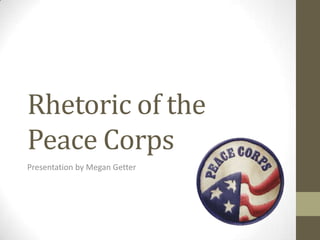
Peace corps
- 1. Rhetoric of the Peace Corps Presentation by Megan Getter
Editor's Notes
- “To promote world peace and friendship through a Peace Corps.. to help the peoples of such countries and areas in meeting their needs for trained manpower... and to help promote a better understanding of the American people on the part of the peoples served and a better understanding of other peoples on the part of theAmerican people.” (p. 1-2, “Peace Corps Act,” 1961)
- The Peace Corps is an organization funded by the United States government and overseen by the U.S. State Department (“Executive Order 10924, Establishment and Administration of the Peace Corps in the Department of State,” 1961). The basic idea of the Peace Corps is for Americans to give two years of service to help those in need aboard. The Peace Corps has been in existence since John F. Kennedy signed the executive order for its establishment in March of 1961. According to its website, the Peace Corps has had over 200,000 volunteers serve in 139 countries “to work on issues ranging from AIDS education to information technology and environmental preservation” (2011). By looking at the rhetoric surrounding the Peace Corps during the 1960s, a greater understanding of the expanse and limitations of such a significant organization can be more thoroughly understood. The rhetorical pieces that will be analyzed include speeches by Kennedy, historical legal documents, and articles written by both critics and advocates of the program during the 1960s.
- John F. Kennedy was serving as senator and was a presidential nominee when he delivered a speech asking students to serve their nation. The act is speech that begins Peace Corps discussion. The scene was 2:00 am on Oct. 14, 1960 at University of Michigan in front of a crowd of 10,000 university students (“Remarks,” 2008). He uses hypophora well in his speech: “How many of you who are going to be doctors, are willing to spend your days in Ghana... I think will depend the answer whether a free society can compete. I think it can!” (“Remarks,” 2008). He challenges students to figure out how they will make a difference once they graduate.
- inaugural AddressDelivered on January 20, 1961, Kennedy asked the American people to join him in the “struggle against the common enemies of man: tyranny, poverty, disease, and war itself” (“Inaugural address,” 1961). One of the primary vehicles Kennedy used to accomplish this triumph was through the Peace Corps. On January 21, 1961, Kennedy created a task force headed by Sargent Shriver to investigate the idea of a Peace Corps (Amin, 1999). Shriver reported with two thumbs up, and Kennedy signed the order (Amin, 1999). At the official signing of the executive order, Kennedy made remarks that illustrated his commitment to the Peace Corps.
- One of the most profound and direct results of the Peace Corps has been the study and development of intercultural communication (Kim, 2005). In “Shop Talk: the communication training of the peace corpsmen,” Ted J. Barnes (assistant professor of speech at the University of Illinois) examines the early communication training that the Peace Corps provided for their volunteers (Sillars & Barnes, 1963). The main purpose of this article is to call attention to the Peace Corps lack of modern communication training. Barnes’ main points are that the Peace Corps provides inadequate communication training, but expects volunteers to excel in situations where communication is crucial. Barnes uses sarcasm to get people enraged at the inadequacies of the program: “obviously the Peace Corps has discovered some new leadership procedures that are far more successful than those we mortal discussion teachers know of” (Sillars et al., 1963).
- Barnes uses sarcasm to get people enraged at the inadequacies of the program: “obviously the Peace Corps has discovered some new leadership procedures that are far more successful than those we mortal discussion teachers know of” (Sillars et al., 1963). . The key conclusions Shriver presents is that the Peace Corps is a necessary component for bettering American lives and the lives of individuals around the world. Of particular note in Shriver’s article is his reference to the Negros that served in the Peace Corps. The Peace Corps was the first government agency to be devoid of discrimination (applicants do not indicate race on the application) because of its aim to “‘see people as people’” (Zimmerman, 1995). In the article, Shriver notes “7.4 percent of our higher echelon positions are filled by Negroes as compared to .8 percent of other government agencies” (1963). The Peace Corps is still criticized for failing to attract more African-Americans when it serves so many Africans aboard.
- Arnold and Marlin Zeitlins article in The Saturday Evening Post is a notable document that criticizes the Peace Corps. The main purpose of this article is to inform the public of the flaws that exist within the Peace Corps: “We are still committed to the Corps’ ideals and purpose, but they cannot be realized unless the Corps reforms some methods and dispenses with some myths,” (Zeitlin et al., 1966).
- The Peace Corps has become an American institution since its inception in 1961. Established and tasked with a mission to make the world a better place, the Peace Corps has been criticized for doing too little and having a mission that was too great. Despite these criticisms, the rhetoric from the 1960s shows a Peace Corps that was respected for embodying the high ideals of American service.
